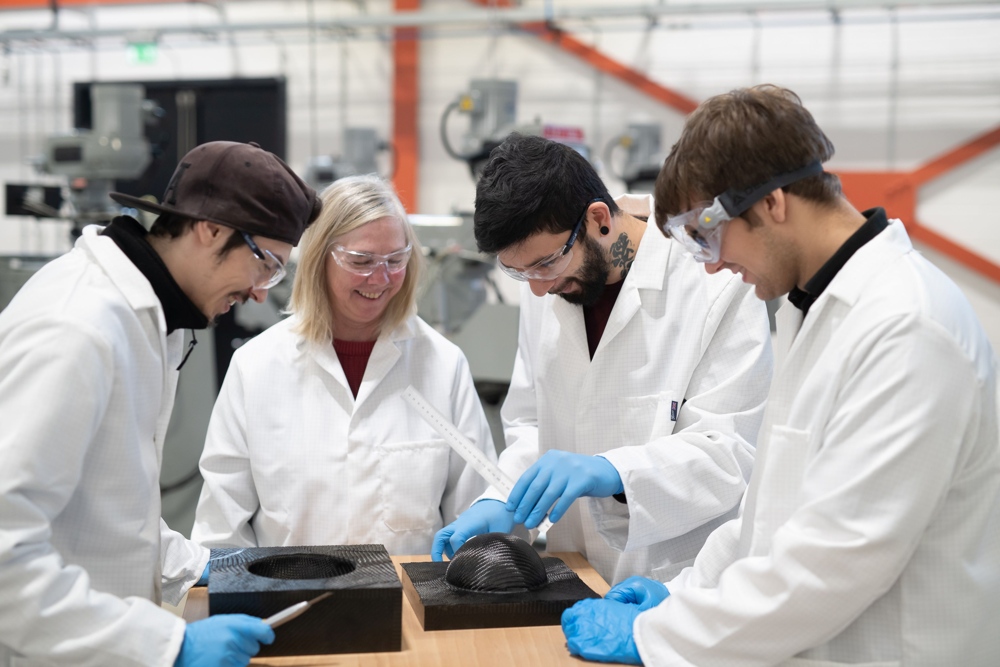Innovations in training

In a Q&A session, Composites in Manufacturing hears the views of iMET’s managing director, Jo Sainsbury on the range of apprenticeships and short training courses the company offers – all within an ideal learning environment.
In a Q&A session, Composites in Manufacturing hears the views of iMET’s managing director, Jo Sainsbury on the range of apprenticeships and short training courses the company offers – all within an ideal learning environment.
iMET, a new technical training centre based at Alconbury Weald commenced training of composite engineering technicians in Autumn 2018. This Level 3 apprenticeship follows the new Composites Engineering Technician standard, ensuring it meets both the demands of local businesses, as well as being aligned with national training initiatives.
Q) Do today’s younger generation tend to approach composites in a different way to traditional materials?
The new generation joining the composites industry are keen to gain a general understanding of all materials, whilst being open to exploring the opportunities of using both new materials and new technologies to create better products. This strive for innovation and excellence is being promoted and encouraged through our technical and practical training for the composites apprenticeship.
Q) Is the Government doing enough to get more involved in manufacturing and particularly in helping SMEs with their training needs?

The introduction of the apprenticeship levy and the opportunity for SMEs to access apprenticeship training through the co-funded route has opened up the potential for more SMEs to consider apprenticeships as a smart choice for both retraining existing employees and developing new talent to help their businesses grow. iMET is committed to providing flexible options to suit businesses, enabling everyone to access high quality training for their staff. We’re also developing a suite of short courses aimed at providing an overview of composites for those who have strong engineering skills from different areas within the manufacturing sector, and are seeking to move into the composites sector.
Q) What feedback have you received from the course lecturers regarding students’ approach and abilities where composite materials are concerned?
We have an interesting first cohort of apprentices at iMET, some of whom have experience in the practical aspects of laminating, and some of whom composites is a completely new field. As a result, our Composites Trainer tailors learning to suit individual needs. In terms of design, a number of our students will explore other materials through the design and prototype process before applying the specifics of composite materials to the design idea. iMET also has a suite of 3D printers for use by the students. These have proved very successful as a quick and cost-efficient way to prototype design ideas at small scale before moving into production using composite materials.
Q) What kind of split is there between practical and theory on your courses?
For the composites engineering technician apprenticeship there is a good mix of theory and practical. iMET is equipped with a brand-new lay-up room, curing oven and a self-contained trim-booth, to enable us to train apprentices in all aspects of the composites production process. Theoretical training follows the well-defined BTEC Composites Engineering Technician qualification and is supplemented by project-based learning to provide a wide range of skills including project planning and commercial knowledge.
Q) Are the Government-led apprenticeship schemes really any good and do employers rate them?
One of the misconceptions is that new apprenticeships are government-led. The new Trailblazer apprenticeship standards system, implemented by government in 2013, has opened up the opportunity for apprenticeships to be truly industry-led. The Level 3 composites engineering technician is a great example of this. The trailblazer group who developed the standard to which we’re now delivering, included a combination of composites manufacturers, research organisations and trade organisations who ensured that the final format was comprehensive and relevant for industry.
There remain some challenges with convincing businesses that apprenticeships are a viable route for building a skilled workforce, but at iMET we believe it is the best way to contribute to the overall upskilling of the industry and ultimately reduce the current skills shortage. We’re working with our existing clients to raise the profile of apprenticeships in the composites industry to those not currently involved, but also to potential recruits at school and college level.
Q) Is there a chronic skills shortage for UK composites and engineering industries that employ composites in manufacture?
Most of the manufacturing businesses that iMET is connected with, including many from the composites sector, report skills shortages as their biggest single business challenge. There appears to be a demand for both building the future pipeline of talent into the industry and a need to develop the skills of those in the industry to create a wider pool of expertise from which companies recruit.
Q) Is enough being done to persuade school-leavers with good hands-on practical skills to take up composites and engineering apprenticeships?

There is always more that industry and training providers a can do to encourage school leavers into the manufacturing sector, and particularly the composites industry. iMET is committed to promoting the career opportunities available in manufacturing as a whole and we are working with businesses to provide insight days and workshop schemes to demonstrate what the composites industry is all about.
Q) Does the UK engineering sector struggle with an image problem in that it’s seen as a dirty career? What can be done to change this perception?
The UK engineering sector does still struggle with image. Engineering is still not understood or explained at school level and as a result, many young people still don’t see the opportunities that exist. This is not limited to composites, I personally experienced similar issues in the building industry as I built my early career as a structural engineer. This has made me determined to ensure that iMET promotes engineering as an exciting and fulfilling career for everyone.
I believe there is a need to talk about engineering differently: to talk about creativity, design, inventing, problem-solving – we need to put the excitement back into engineering for future generations. Initiatives such as The Royal Academy of Engineering’s ‘This is Engineering’ campaign are starting to turn the tide, both training providers and businesses can help by building on these initiatives using their own real-life examples.
Q) Has the march of technology and changing social/parental habits combined to affect a child’s interest in simple things like building Airfix models, go-karts and flying kites? They seem more content to play on their home computers and smart phones than having ‘learning’ adventures, and are therefore they are less likely to develop practical skills?
The world is changing; technology is here to stay and is developing at a phenomenal rate. Our job is to harness the potential of technology and use it to create the next generation of products and processes. Young children will still be curious about the world, both the physical building of things and use of technology to build, monitor, control, so the opportunity with younger children is to introduce the concept of engineering through both mediums to inspire them to create and innovate from an early age.









